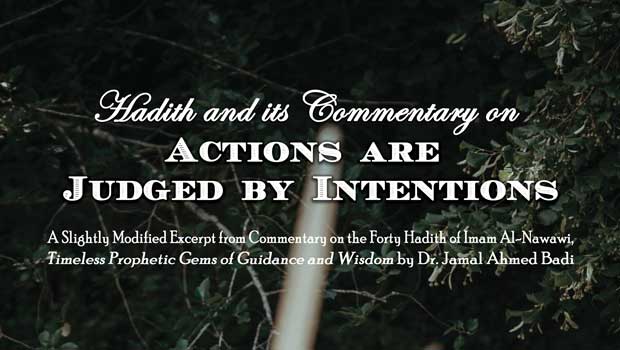Hayaa’ is shyness, bashfulness, humility, modesty (intellectual and otherwise) and no one English word conveys the full meaning of this Islamic virtue. For this reason, Muslim educators have suggested the use of the Arabic word itself, rather than a translation of hayaa’. As beautiful as it is encompassing, hayaa’ stands tall in its meaning, and is rooted in prophetic teachings throughout human history. It is the peak of a value system, which unfortunately humanity has in large forgotten. Muslims themselves are in need of its re-discovery so that the people in the world will recognize this virtue in Muslims before their tongues utter a word.
Craving wealth or fame or power, or running after unbridled desires or fun without proper bounds and limits, will never bring happiness
This article intends to explore hayaa’, what it is and what it is not. Some background is a good place to start. The Messenger of Allah (peace be upon him) said: “Verily your Lord is the One Modest and Generous, and when His servant raises his hands to Him in supplication, He is diffident from returning them empty” (Termidhi and others). Our Lord is described in this prophetic tradition as having the sifa (divine characteristic) of perfection and completeness of hayaa’, befitting His majesty and Divine authority. His hayaa’ is unlike that of humans; it is a hayaa’ of abundant generosity, kindness, and elevation above all His creation.
It is out of this hayaa’ that He refers to the human nature of His prophets and messengers in a special, but simple way: “They were (men) who ate food and walked through the streets” (25:20); a straightforward description of the normal activities, including the cycle of eating food. But beyond all, and despite their nobilityand a status, fit for selection as Divine messengers , they themselves remain human and have no share in divinity.
It is also out of His greatness and ultimate power that He exercises hayaa’ and refrains from exposing human beings, His servants, despite their propensity for disobedience, sometimes in the open and in full defiance of his Maker. Man is the one who is weak, in need of assistance, and surviving on provisions from his Creator, whether air, water and food, or guidance. At the same time, Allah (be He exalted), out of love for His creation, draws His servant to Him by bestowing His bounties on him. If the servant makes a step towards his Lord, his Lord in return reciprocates with much more; this is the hayaa’ of the Divine . By contrast, human defiance stems from ignorance of the Divine, which leads to a lack of hayaa’. This is why the first command in revelation is an invitation to read, learn, and understand — ‘ilm (knowledge) is a cornerstone of Islam.
In a far-reaching narration, explaining the scope of hayaa’, the messenger of Allah (peace be upon him) said: “Exercise hayaa’ towards your Lord, the true hayaa’.” We said, “O! Messenger of Allah, we do exercise hayaa’, thanks be to God!” He said: “It is not that hayaa’, but it is to exercise hayaa’ from Allah, the true hayaa’— that you protect the mind and that which it perceives/retains, and protect the stomach and that which it contains (goes into it), that you remember death and testing, and whoever desires the last day, would leave out the beauty of this world; whoever does that then has exercised the true hayaa’ from Allah” (Termidhi). This narration is an invitation to observe the mind and that which filters into and is retained by it. Everything that shapes thought and reasoning, as part of the constant search for the truth, is an individual responsibility. Therefore we are commanded to always search for haq (truth, justice)and accept it, and reject batil (falsehood, injustice) whatever its source. We are taught to have the courage to accept a truth once discovered, even after years of practicing its opposite, as well as to speak up in support of the truth regardless of the outcome. In the second case particularly, failing to do so should certainly not be under the justification of hayaa’, for the Qur’an teaching early companions visitation manners relates:” Such behaviour annoys the Prophet and he exercised haya’ towards you, and Allah does not exhibit hayaa’ to tell you the truth” (33:53). The intellect must be sound and should have an urge to challenge ideas, reject unfounded concepts. It is out of lack of hayaa’ from Allah to insist on falsehood after being corrected. In today’s terminology, this would be ultimate intellectual arrogance. This applies to Muslims first; we are commanded to learn the pristine religion, which sometimes may not be in line with our cultural inheritance. To non-Muslims, it is an invitation to discover Islam with an open mind, explore its tenants, its contribution to humanity, and its stand on many issues of today. This can present a positive challenge to the intellect, as recently discovered by a former member of a Dutch right-wing political party. His original intent was to research Islam in order to vilify the religion and its prophet (peace be upon him). But in the process, he discovered something different from what he had previously perceived about the Islamic faith. His journey was a true freeing of the intellect and a disavowing of intellectual arrogance.
Muslims should welcome this type of change, learn how to embrace it, and forgive past excesses of those who spoke ill of Islam. Fundamentally, Muslims must treat people with respect for their humanity despite the sometimes strong disagreement with their beliefs. The cardinal rule must be to engage the outspoken critic, hold the hand and remove the road blocks so they might find their own path of discovery. Such behavior will generate the desired hayaa’, i.e. deflate all intellectual arrogance. If Muslims succeed in doing so, they should be confident of the eventual outcome: A life correction in thought and attitude from the most obstinate. Meanwhile, when those who defame Islam do so loudly,, do Muslims really derive benefit from their own loud protests that generate counter protests, increased hate and obstinacy from the “other”? One should ponder what would have been the outcome if the Prophet (peace be upon him) responded with such a bellicose approach to the endless and hayaa’-less provocations of Abu-Jahl and his clan.
Earning what is lawful and claiming only what rightfully belongs to you, and consuming nothing that is unlawful, is another pillar of hayaa’. This includes refraining from illicit earning or consuming what is haraam (forbidden) as well as earning or consuming that which is legal in itself but acquired through illegal means. Today we see widespread corruption and the unchecked self-enrichment of the few, while the majority of people suffer in despicable living conditions. Those who continue to engage in such behavior have certainly no hayaa’, neither in front of their people nor the world, let alone their Lord. Likewise is the case of those who disregard the popular will, crush ballot boxes or peaceful protests and plunge their countries into civil wars that destroy property and cause the deaths of thousands, with countless others disappeared or displaced. What would have been the outcome if they just had hayaa’ and deflated the arrogance that led them to obdurately hold onto power despite a legitimate, clear and loud popular message?
Arrogance and egotism make one blind, unable to learn from the present or the past, and unwilling to consider anything beyond one’s own self-interest. All should remember that if one somehow escapes the justice of this world, there will be no escape of the justice of the hereafter. The governor and the governed, the weak and the powerful, all shall be made to answer for their deeds. This belief is powerful and shapes the worldview and disposition of a Muslim. This is what gives strength to the believer to withstand temptation by the glamour of this world. Hayaa’ is a mighty protection against breaking boundaries and engaging in illicit activity in order to fulfill desires. Thus the drive to observe limits and refrain from disobedience out of hayaa’ before one’s Lord (be He exalted) —knowing that one is fully seen at all times, including when alone and out of the sight of other humans.
In another prophetic tradition, The Messenger of Allah (peace be upon him) said, “Verily, from what was learnt by people from the words of earliest prophethood is this: If you exercise (or have) no hayaa’, then do as you wish” (Bukhari). This is a clear indication that hayaa’ is a noble character that was known and practiced by people and nations throughout history, through the teachings of various prophets. It is not a new concept. As for “do as you wish,” this is not a sanction to actually do what you wish without boundary, or that you are free to do what you wish, but rather a warning that without hayaa’, illicit actions will follow. It is inferred, and supported by other teachings, that all infractions will be severely recompensed by the Creator, that every illicit deed shall be met with its measure in torment. In this regard, the Qur’an is clear: “Do what you wish; verily He sees clearly all that you do” (41:40). The barrier against illicit and lewd acts is hayaa’, and once removed, the slide to self-destruction begins.
The final aspect of hayaa’ is the one most commonly understood amongst Muslims. It is the one illustrated, for example, in the verses from the Qur’an related to the story of Prophet Musa (peace be upon him): “And when he arrived at the water of Madyan, he found there a group of men watering, and besides them he found two women who were keeping back (their flocks). He said: ‘What is the matter with you?’ They said: ‘we cannot water (our flocks) until the shepherds take (their flocks). And our father is a very old man.” (28:23). The women were keeping back, not thrusting themselves amongst men: Out of hayaa’, they would wait until the time was appropriate rather than risk being exposed to unpleasant or improper behavior or unwelcome advances. This illustrates well that hayaa’ as displayed by these two women is part of the teaching of early prophets, even before Musa (peace be upon him), as mentioned in the tradition quoted previously. As the Qur’anic story continues, Musa (peace be upon him) takes the initiative and waters the women’s flocks, “Then he turned back to shade, and said: ‘My Lord! Truly, I am in need of whatever good that You bestow on me!’’ (28:24). This is a profound exercise in humility as he turns to His Lord in supplication. Despite being in a strange town, not knowing where to go, nor having any acquaintance, he addresses his Lord in full reverence, without complaint or direct request. Afterwards, the Qur’an relates the following: “Then there came to him one of them, walking shyly. She said: ‘Verily, my father calls you that he may reward you for having watered (our flocks) for us’’ (28:25); an expression of hayaa’ by a woman talking to a stranger. The beautiful outcome of this encounter is told in the next few verses of the same chapter, where again with hayaa’, one of the women suggests to her father that he should hire this man, the “strong and trustworthy.” And the story ends with the marriage of Musa (peace be upon him) to one of the women. There is no indication that Musa (peace be upon him) had such expectation with his humble supplication earlier, or that the woman, when she exhibited haya’, realized that she would become the wife of one of the most prominent prophets in human history! This story illustrates a Prophetic tradition: “When lewdness is a part of anything, it makes it defective; and when hayaa’ is a part of anything it makes it beautiful.”
A fitting closure is what Prophet Muhammad (peace be upon him) has said: “Every faith has an innate character. The character of Islam is hayaa’.” (Al-Muwatta of Imam Malik).






